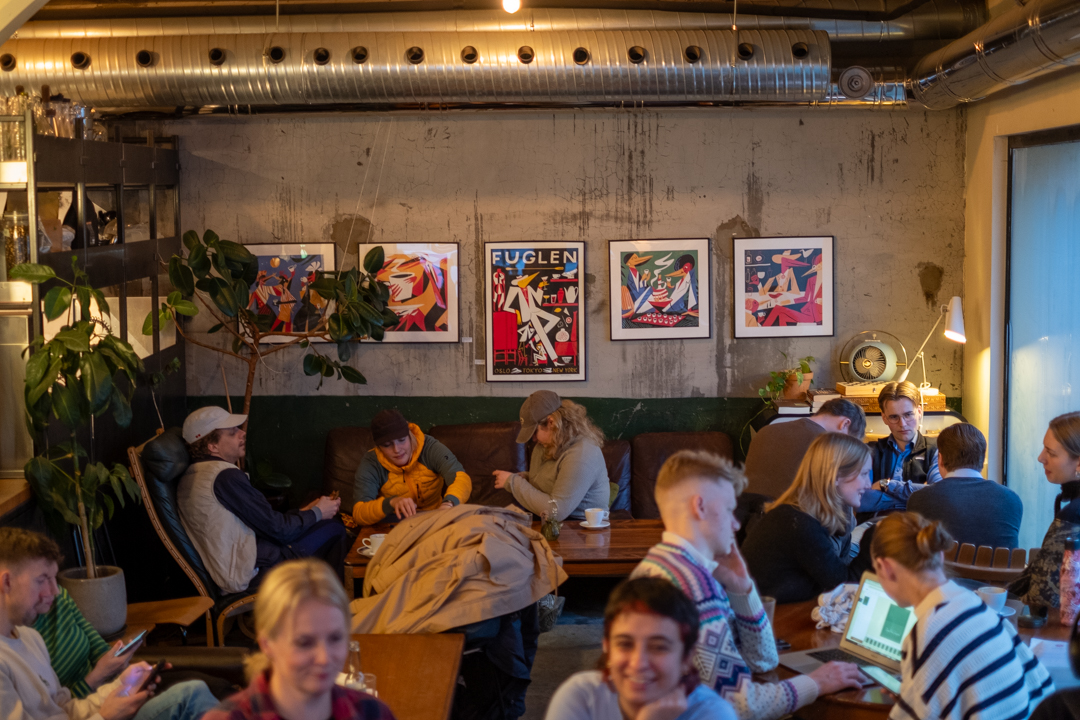In Oslo’s café scene, Fuglen’s story is a legend that has been told a thousand times. It was one of the forerunners of the third-wave coffee movement, and it remains a proud Scandinavian coffee representative with true international influence. Today, it is still one of the most popular cafés and roasteries in Oslo and Tokyo—arguably two of the world’s most important coffee cities.
Fuglen Gamlebyen



The trio behind Fuglen are Einar Kleppe Holthe, Peppe Trulsen, and Halvor Digernes. Each takes charge of a specific area of the business: Holthe oversees coffee, Trulsen furniture and design, while Digernes—the latest addition to the team—creates the cocktails.
Holthe began his career at Stockfleths, a well-known café chain. By the age of 24, he had already attained a director-level position, overseeing 150 employees and eight shops. At the time, Stockfleths had a sister café called Kaffefuglen at Universitetsgata, first opened in 1963 by two women selling coffee and tea. Over the years, it became something of a secret gathering spot for coffee enthusiasts in Oslo. When Holthe heard that the company planned to shut it down, he sensed an opportunity to start a business of his own.
For the symbolic sum of 1 NOK, according to an article in Dagsavisen, Holthe took over the shop and reopened it as Fuglen, together with Peppe Trulsen. Trulsen, then running a vintage furniture shop, was passionate about preserving Norway’s tradition of craftsmanship—something he feared was being lost after the country became an oil nation. Thus, the fusion of coffee and vintage Norwegian furniture design was part of Fuglen’s DNA from the start.
Fuglen Universitetsgata


In 2008, a space offering specialty coffee sourced directly from farmers was still relatively new in Oslo (though Tim Wendelboe had also begun his own venture). Fuglen quickly established itself as a go-to place for both casual coffee drinkers and enthusiasts. To extend its business into the evenings, Holthe and Trulsen brought in Halvor Digernes, an experienced bartender, to run the cocktail bar. This setup remains in place today.
In 2007, after winning Norway’s national Barista Championship, Holthe travelled to Tokyo to represent Norway in the world finals. The competition didn’t go his way, but he spent a few days wandering the city. He had been obsessed with Japan “since childhood,” Holthe told Dagsavisen, and he was determined to open a shop there one day.
Four years after relaunching Fuglen in Oslo, Holthe got his chance. In 2012, a Japanese-Norwegian friend in Oslo offered to rent out his late grandparents’ house in Tokyo, giving them a space to create the kind of café they envisioned. The trio took the opportunity, and in May 2012, Fuglen Tokyo opened in the Shibuya district.
The café quickly became an international sensation. In 2011, Monocle magazine hailed Fuglen as one of the world’s best retail concepts. Today, the brand has grown into a chain of 10 bars and two roasteries across Norway, Japan, South Korea, and Indonesia. In Oslo, they opened a roastery in Gamle Oslo in 2018, followed by several collaboration shops, including Byens Gulv.





Yet it’s worth noting that Fuglen in Oslo, as a brand, looms far larger than its physical shops. In fact, beans roasted by Fuglen can be found in many specialty cafés across the city.
It’s easy to take the ubiquity of Fuglen beans as a testament to their quality. But conversations with various small, independent cafés suggest there’s more to it. What we’ve heard is that Fuglen has a dedicated team supporting new and independent cafés—not only helping them select beans and refine brewing techniques, but even fine-tuning machines to meet each shop’s needs. This kind of hands-on support is not common among the more prominent roasteries in Oslo.
In addition, Fuglen often collaborates with small shops to develop their own house blends. For cafés that wish to create a private label, Fuglen helps them choose the right beans, then designs packaging in line with the café’s own aesthetic. We’ve heard stories of other roasteries being more protective and restrictive with their logos and branding. There’s a reason Fuglen has become so widely beloved.




Since the earliest days of his career, Holthe has said he doesn’t work just for money, but to create value for society. That’s why he was among the first in the industry to bypass middlemen and purchase coffee directly from farmers—unintentionally becoming a central figure in the third-wave movement. Over the years, whether in Asia or the Americas, Fuglen has transcended the idea of a café and become a kind of ambassador for Norwegian cultural and social ideals. Holthe has certainly stayed true to his word.
